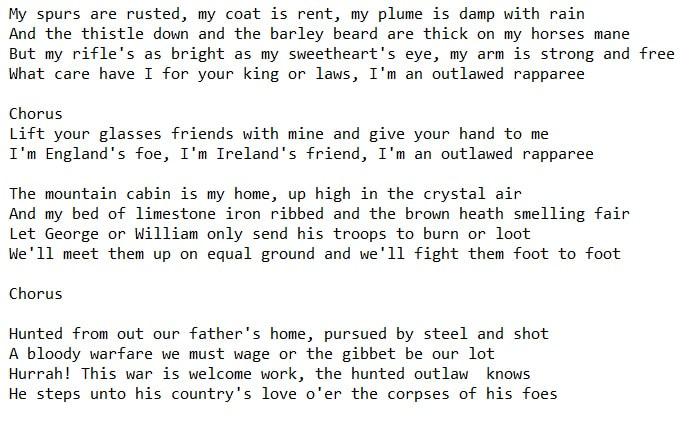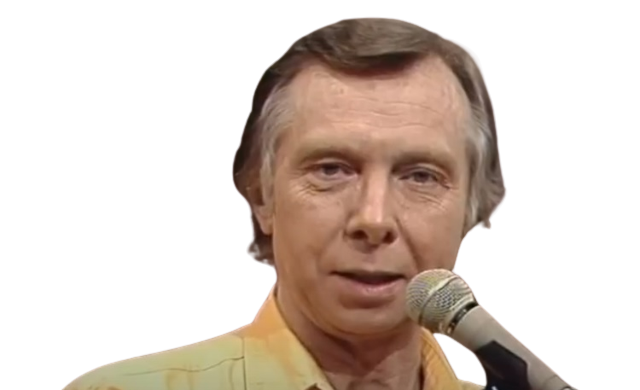The Outlawed Rapparee Lyrics And Chords
The Outlawed Rapparee Lyrics and easy guitar chords as used by the Clancy Brothers and Tommy Makem, PDF Sheet Music Notes Included, guitar tab by Marc Fahrbach, as you can see from the spelling in the song it's sometimes called ''The Outlawed Raparee.The 5 string banjo chords in C Major are included. Another band that later covered the song was ''The Raparees'' . The guitar chords in D Major are in chordpro.
The Outlawed Rapparee song is a powerful piece of music that has been passed down through generations in Ireland. It is a song that tells the story of resistance against oppression and injustice, and has been used as a tool for social and political change. This thesis will explore the history and significance of the Outlawed Rapparee song, examining its cultural and political context, its themes and messages, and its impact on Irish society.
The Outlawed Rapparee song originated in the 17th century during the time of British rule in Ireland. The term 'rapparee' was used to describe Irish rebels who resisted British forces through guerrilla tactics. These rebels were considered outlaws by the British and were often hunted down and executed. The song was created as a form of resistance and rebellion, serving as a way for the Irish people to express their discontent with British rule.
The song has its roots in the oral tradition of Irish music, with no known author or composer. It was passed down from generation to generation through the Irish language, and was often performed in secret due to its rebellious nature. The lyrics of the song were constantly evolving, with different versions being sung in different areas of Ireland. This allowed for the song to adapt to changing political and social circumstances, making it a powerful tool for resistance.
One of the key themes of the Outlawed Rapparee song is the idea of Irish identity and nationalism. The lyrics often celebrate the bravery and heroism of the Irish rebels, portraying them as martyrs for the cause of Irish freedom. The song also highlights the resilience and determination of the Irish people in the face of oppression, and serves as a reminder of the ongoing struggle for independence.
Another important theme in the Outlawed Rapparee song is the idea of social justice and equality. The lyrics often condemn the actions of the British authorities and the injustices faced by the Irish people. The song also calls for unity and solidarity amongst the Irish people, emphasizing the need to stand together against their oppressors. This message of solidarity and resistance is still relevant today, as the song continues to be sung at political rallies and protests.
The Outlawed Rapparee song also has a strong connection to Irish culture and tradition. It is often performed in a traditional style, with instruments such as the fiddle, tin whistle, and bodhrán. The song's lyrics are written in the Irish language, which adds to its cultural significance and serves as a way to preserve the language and heritage of Ireland. The song has become an important part of Irish music and is often performed at cultural events and festivals.
The impact of the Outlawed Rapparee song on Irish society cannot be underestimated. It has been used as a form of resistance and rebellion against British rule, serving as a way for the Irish people to express their frustrations and call for change. The song has also played a role in shaping Irish identity and promoting a sense of national pride. It has been passed down through generations and continues to be sung today, demonstrating its enduring relevance and power.
In conclusion, the Outlawed Rapparee song is a significant piece of music in Irish history. It has served as a form of resistance and rebellion, promoting Irish identity and calling for social and political change. The song's themes of nationalism, social justice, and cultural heritage are still relevant today, and its impact on Irish society continues to be felt. As long as the struggle for Irish independence and equality continues, the Outlawed Rapparee song will remain an important symbol of resistance and hope.
The Outlawed Rapparee song originated in the 17th century during the time of British rule in Ireland. The term 'rapparee' was used to describe Irish rebels who resisted British forces through guerrilla tactics. These rebels were considered outlaws by the British and were often hunted down and executed. The song was created as a form of resistance and rebellion, serving as a way for the Irish people to express their discontent with British rule.
The song has its roots in the oral tradition of Irish music, with no known author or composer. It was passed down from generation to generation through the Irish language, and was often performed in secret due to its rebellious nature. The lyrics of the song were constantly evolving, with different versions being sung in different areas of Ireland. This allowed for the song to adapt to changing political and social circumstances, making it a powerful tool for resistance.
One of the key themes of the Outlawed Rapparee song is the idea of Irish identity and nationalism. The lyrics often celebrate the bravery and heroism of the Irish rebels, portraying them as martyrs for the cause of Irish freedom. The song also highlights the resilience and determination of the Irish people in the face of oppression, and serves as a reminder of the ongoing struggle for independence.
Another important theme in the Outlawed Rapparee song is the idea of social justice and equality. The lyrics often condemn the actions of the British authorities and the injustices faced by the Irish people. The song also calls for unity and solidarity amongst the Irish people, emphasizing the need to stand together against their oppressors. This message of solidarity and resistance is still relevant today, as the song continues to be sung at political rallies and protests.
The Outlawed Rapparee song also has a strong connection to Irish culture and tradition. It is often performed in a traditional style, with instruments such as the fiddle, tin whistle, and bodhrán. The song's lyrics are written in the Irish language, which adds to its cultural significance and serves as a way to preserve the language and heritage of Ireland. The song has become an important part of Irish music and is often performed at cultural events and festivals.
The impact of the Outlawed Rapparee song on Irish society cannot be underestimated. It has been used as a form of resistance and rebellion against British rule, serving as a way for the Irish people to express their frustrations and call for change. The song has also played a role in shaping Irish identity and promoting a sense of national pride. It has been passed down through generations and continues to be sung today, demonstrating its enduring relevance and power.
In conclusion, the Outlawed Rapparee song is a significant piece of music in Irish history. It has served as a form of resistance and rebellion, promoting Irish identity and calling for social and political change. The song's themes of nationalism, social justice, and cultural heritage are still relevant today, and its impact on Irish society continues to be felt. As long as the struggle for Irish independence and equality continues, the Outlawed Rapparee song will remain an important symbol of resistance and hope.
My [D]spurs are rusted, my [G]coat is [A]rent, my [D]plume is damp with rain
And the [G]thistle [A]down and the [D]barley [Bm]beard are [G]thick on my [A]horses [D]mane
But my rifle's as [G]bright as my [Em]sweetheart's [D]eye, my arm is [G]strong and [Em]free
What [D]care have [G]I for your [Em]king or [D]laws, I'm an outlawed [A]rappa[D]ree
Chorus
[D]Lift your glasses friends with mine and give your hand to [A]me
I'm [G]England's [D]foe, I'm [Em]Ireland's [D]friend, I'm an outlawed [A]rappa[D]ree
The [D]mountain cabin [G]is my [A]home, up [D]high in the crystal air
And my [G]bed of [A]limestone [D]iron [Bm]ribbed and the [G]brown heath [A]smelling [D]fair
Let George or [G]William [Em]only [D]send his troops to [G]burn or [Em]loot
We'll [D]meet them [G]up on [Em]equal [D]ground and we'll fight them [A]foot to [D]foot
Chorus
[D]Hunted from out our [G]father's [A]home, pur[D]sued by steel and shot
A [G]bloody [A]warfare [D]we must [Bm]wage or the [G]gibbet [A]be our [D]lot
Hurrah! This [G]war is [Em]welcome [D]work, the hunted [G]outlaw [Em]knows
He [D]steps un[G]to his [Em]country's [D]love o'er the corpses [A]of his [D]foes
Chorus
And the [G]thistle [A]down and the [D]barley [Bm]beard are [G]thick on my [A]horses [D]mane
But my rifle's as [G]bright as my [Em]sweetheart's [D]eye, my arm is [G]strong and [Em]free
What [D]care have [G]I for your [Em]king or [D]laws, I'm an outlawed [A]rappa[D]ree
Chorus
[D]Lift your glasses friends with mine and give your hand to [A]me
I'm [G]England's [D]foe, I'm [Em]Ireland's [D]friend, I'm an outlawed [A]rappa[D]ree
The [D]mountain cabin [G]is my [A]home, up [D]high in the crystal air
And my [G]bed of [A]limestone [D]iron [Bm]ribbed and the [G]brown heath [A]smelling [D]fair
Let George or [G]William [Em]only [D]send his troops to [G]burn or [Em]loot
We'll [D]meet them [G]up on [Em]equal [D]ground and we'll fight them [A]foot to [D]foot
Chorus
[D]Hunted from out our [G]father's [A]home, pur[D]sued by steel and shot
A [G]bloody [A]warfare [D]we must [Bm]wage or the [G]gibbet [A]be our [D]lot
Hurrah! This [G]war is [Em]welcome [D]work, the hunted [G]outlaw [Em]knows
He [D]steps un[G]to his [Em]country's [D]love o'er the corpses [A]of his [D]foes
Chorus
Alternative chords for the key of C Major.
My [C]spurs are rusted, my [F]coat is [G]rent, my [C]plume is damp with rain
And the [F]thistle [G]down and the [C]barley [Am]beard are [F]thick on my [G]horses [C]mane
But my rifle's as [F]bright as my [Dm]sweetheart's [C]eye, my arm is [F]strong and [Dm]free
What [C]care have [F]I for your [Dm]king or [C]laws, I'm an outlawed [G]rappa[C]ree
Chorus
[C]Lift your glasses friends with mine and give your hand to [G]me
I'm [F]England's [C]foe, I'm [Dm]Ireland's [C]friend, I'm an outlawed [G]rappa[C]ree
Below are the 5 string banjo chords for this version in C Major.
My [C]spurs are rusted, my [F]coat is [G]rent, my [C]plume is damp with rain
And the [F]thistle [G]down and the [C]barley [Am]beard are [F]thick on my [G]horses [C]mane
But my rifle's as [F]bright as my [Dm]sweetheart's [C]eye, my arm is [F]strong and [Dm]free
What [C]care have [F]I for your [Dm]king or [C]laws, I'm an outlawed [G]rappa[C]ree
Chorus
[C]Lift your glasses friends with mine and give your hand to [G]me
I'm [F]England's [C]foe, I'm [Dm]Ireland's [C]friend, I'm an outlawed [G]rappa[C]ree
Below are the 5 string banjo chords for this version in C Major.
Included below is a pdf of the sheet music lyrics and chords for The Rapparee



